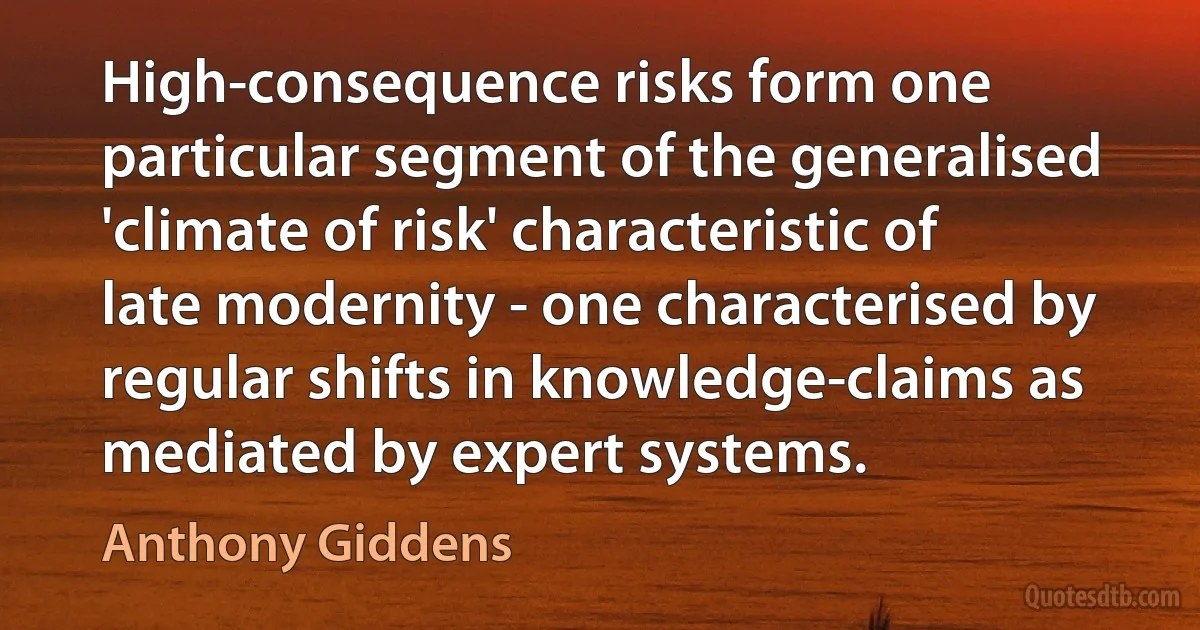Modernity Quotes - page 4
Our task as image-bearing, God-loving, Christ-shaped, Spirit-filled Christians, following Christ and shaping our world, is to announce redemption to a world that has discovered its fallenness, to announce healing to a world that has discovered its brokenness, to proclaim love and trust to a world that knows only exploitation, fear and suspicion...The gospel of Jesus points us and indeed urges us to be at the leading edge of the whole culture, articulating in story and music and art and philosophy and education and poetry and politics and theology and even--heaven help us--Biblical studies, a worldview that will mount the historically-rooted Christian challenge to both modernity and postmodernity, leading the way...with joy and humor and gentleness and good judgment and true wisdom. I believe if we face the question, "if not now, then when?" if we are grasped by this vision we may also hear the question, "if not us, then who?"

N.T. Wright
‘... the history of the "secular” as a cultural, humane, interstitial space in the midst of logos itself, has lost out to the idea of the "secular” as a fundamental manifestation of the rationality of the nation-state, just as the histories of modernity and cosmopolitanism in India have been subsumed, in our time, and for a variety of reasons, by a history of the nation.'

Amit Chaudhuri
‘... this refined language of Indian modernity – an Indian language that was actually first used as a first language by a home-grown cosmopolitan elite – enough to say, with or without humour, ‘Ami tomake bhalobashi' (‘I love you') or ‘Apni kothai thhaken?' (‘Where do you live?). These stray statements performed an incantatory ‘open sesame' – into the bounded, charmed, small-scale world of ‘Bengaliness'. The ‘honorary' Bengali might be myopic; might be an aficionado of art-house cinema; might be politically left wing; might have taste for lyric poetry; a tendency towards the autobiographical; an appetite for fish; or display none of these traits.' [citation needed].

Amit Chaudhuri
[E]ugenic doctrine did not originate with the Nazis. It began with polite, urbane, well-educated, sophisticated people who saw "social hygiene" via, among other methods, euthanasia, as representing progress and modernity. They wanted to ditch the old Judaeo-Christian belief in the sanctity of all human life and replace it with what they regarded as a more advanced and rational philosophy.

Robert P. George
If the gospel is to challenge the public life of our society, if Christians are to occupy the "high ground" which they vacated in the noon time of "modernity," it will not be by forming a Christian political party, or by aggressive propaganda campaigns. Once again it has to be said that there can be no going back to the "Constantinian" era. It will only be by movements that begin with the local congregation in which the reality of the new creation is present, known, and experienced, and from which men and women will go into every sector of public life to claim it for Christ, to unmask the illusions which have remained hidden and to expose all areas of public life to the illumination of the gospel. But that will only happen as and when local congregations renounce an introverted concern for their own life, and recognize that they exist for the sake of those who are not members, as sign, instrument, and foretaste of God's redeeming grace for the whole life of society.

Lesslie Newbigin
Western social Darwinists, who include modernisation and development theorists and their kindred spirits (UN agencies, human rights organisations and activists, NGOs, the IMF, the World Bank, the US State Department, etc) would see the possible "advance" of the Arab world (as well as the rest of the "underdeveloped" world) toward a western-defined and sponsored modernity as part of a historical teleology wherein non-Europeans who are still at the stage of European childhood will eventually replicate European "progress" toward modern forms of organisation, sociality, economics, politics and sexual desires. What is emerging in the Arab (and the rest of the third) world is not some universal schema of the march of history but rather the imposition of these western modes by different forceful means and their adoption by third world elites, thus foreclosing and repressing myriad ways of movement and change and ensuring that only one way for transformation is made possible.

Joseph Massad
Freud ... hoped that somehow, despite the near equality of our warring emotions, reason would cleverly manage to reassert itself, despite its congenital weakness-not in the high and mighty way preached by Plato and his Christian successors but in a modest, even sly manner that would alternately dazzle and lull the more powerful emotions into submission. This way actually demands, it seems, the kind of character ideal we have called the "therapeutic” in order to contrast it with the more rigid character ideal produced by the moral demand systems preceding modernity. In the age of psychologizing, clarity about oneself supersedes devotion to an ideal as the model of right conduct.

Philip Rieff
As the world grows smaller, you might think it would be easier for human beings to recognize how similar we are; to understand that we're all basically seeking the same things; that we all hope for the chance to live out our lives with some measure of happiness and fulfillment for ourselves and our families.
And yet somehow, given the dizzying pace of globalization, the cultural leveling of modernity, it perhaps comes as no surprise that people fear the loss of what they cherish in their particular identities - their race, their tribe, and perhaps most powerfully their religion. In some places, this fear has led to conflict. At times, it even feels like we're moving backwards.

Barack Obama
As modern interpolators... say, the bubonic plague winnowed down Europe's population to a scale more congenial with its resource base. After that big first wave of the disease, [the] land was cheaper and human labor better rewarded. Eventually, more food got around. Incidentally, the plague provoked nostalgia for the classical antiquity of Greece and Rome, especially among the scholars of Florence, launching the extravaganzas of the Renaissance [which led to the Age of Exploration and the Scientific Revolution], the Enlightenment [which led to the Industrial Revolution which, in turn, led] [...] eventually [to] our own pageant of techno-supremacist Modernity [which led to the problems we face today].

James Howard Kunstler

![‘Calcutta, for me, was a particular idea of the modern city, and I found it in many forms, works, and genres. ... by ‘modernity' I have in mind something that was never new. True modernity was born with the aura of inherited decay and life. ... if you look at paintings and photographs, and see old films of the city, you notice that these walls and buildings were never new – that Calcutta was born to look more or less as I saw it as a child. I'm not referring here to an air of timelessness; the patina that gave to Calcutta's alleys, doorways, and houses their continuity and disposition is very different from the eternity that defines mausoleums and monuments. It's this quality I'm trying to get at when I speak of modernity. ... modernity in the nineteenth century is indistinguishable from nature; perhaps it is nature – in some ways, the culvert, which has emerged from the rock, seems more of its place than the mountain itself.' [citation needed]. (Amit Chaudhuri)](https://cdn.quotesdtb.com/img/quotes_images_webp/98/amit-chaudhuri-air-aura-863798.webp)

